| Listing 1 - 10 of 15 | << page >> |
Sort by
|
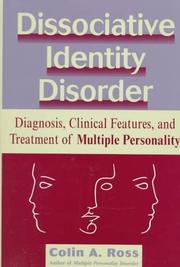
ISBN: 0471132659 Year: 1997 Publisher: Chichester : Wiley,
Abstract | Keywords | Export | Availability | Bookmark
 Loading...
Loading...Choose an application
- Reference Manager
- EndNote
- RefWorks (Direct export to RefWorks)
Book
ISBN: 0367325403 0429901550 0429476787 1782412719 9781782412717 1322088578 9781322088570 9781782201342 0429915780 Year: 2014
Abstract | Keywords | Export | Availability | Bookmark
 Loading...
Loading...Choose an application
- Reference Manager
- EndNote
- RefWorks (Direct export to RefWorks)
This book is the product of a Campaign Day which was organised to raise awareness of Dissociative Identity Disorder (''DID''). The Paracelsus Trust undertook to bring people together, and individuals were enabled to tell their story to the audience. As this had been a profoundly moving experience, it was decided to put the presentations into a book and hence this publication. The book recounts some painful personal experiences and some ideas for ways forward, always recognising the pain of the condition and the abuse that precedes it.The Paracelsus Trust is a Charity which exists to support pe
Multiple personality --- Alternating personality --- Consciousness, Multiple --- DID (Personality disorder) --- Dissociated personality --- Dissociative identity disorder --- Double consciousness --- Double personality --- Dual personality --- MPD (Personality disorder) --- Multiple consciousness --- Multiple identity disorder --- Multiple personalities --- Multiple personality disorder --- Personality, Multiple --- Split personality --- Dissociative disorders --- Treatment.
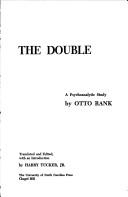
ISBN: 9781469610214 1469610213 0807897981 9780807897980 0807811556 9780807811559 9798890876041 Year: 1971 Publisher: Chapel Hill : University of North Carolina Press,
Abstract | Keywords | Export | Availability | Bookmark
 Loading...
Loading...Choose an application
- Reference Manager
- EndNote
- RefWorks (Direct export to RefWorks)
Alive, fresh, and stimulating, the theme of The Double comprises the issues of identity, narcissism, and the fear of death--actually the core of human existence. Rank's book is primarily a study of the double as it appeared in striking examples in German, French, Russian, English, and American literature from Goethe to Oscar Wilde.
Multiple personality. --- Alternating personality --- Consciousness, Multiple --- DID (Personality disorder) --- Dissociated personality --- Dissociative identity disorder --- Double consciousness --- Double personality --- Dual personality --- MPD (Personality disorder) --- Multiple consciousness --- Multiple identity disorder --- Multiple personalities --- Multiple personality disorder --- Personality, Multiple --- Split personality --- Dissociative disorders
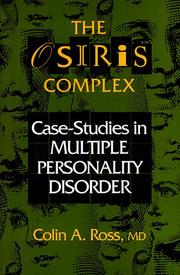
ISBN: 1282045466 9786612045462 1442681977 9781442681972 0802028586 0802073581 9780802073587 9780802028587 9781282045460 0802079830 1281997692 1442675527 9786611997694 Year: 1994 Publisher: Toronto Buffalo London University of Toronto Press
Abstract | Keywords | Export | Availability | Bookmark
 Loading...
Loading...Choose an application
- Reference Manager
- EndNote
- RefWorks (Direct export to RefWorks)
"Based on adult memories of childhood, this book investigates a wide selection of experiences of growing up. Sutherland lays out the structure of children's lives in such settings as the home, the classroom, the church, the street, and the playground - in short, in the communities of childhood. He explains how children arrived at their gender, class, and other identities, and how they came to adopt the values they did. Sutherland focuses on recurrent, common features of the everyday life of children." "This book offers a unique, child-centred approach developed by a leading expert on the history of Canadian childhood. Written in straightforward, jargon-free language and illustrated with numerous photographs, it will be of special interest to those in the fields of social and educational history. Also, because Sutherland is successful in describing the perceptions and feelings of children, it will intrigue anyone who grew up in this period or who wants to understand the experiences of friends and family who did."--Jacket
Multiple personality. --- Multiple personality --- Alternating personality --- Consciousness, Multiple --- DID (Personality disorder) --- Dissociated personality --- Dissociative identity disorder --- Double consciousness --- Double personality --- Dual personality --- MPD (Personality disorder) --- Multiple consciousness --- Multiple identity disorder --- Multiple personalities --- Multiple personality disorder --- Personality, Multiple --- Split personality --- Dissociative disorders --- Case studies --- Children --- History --- Kanada --- Canada. --- Kanada.
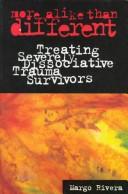
ISBN: 1442664843 9781442664845 0802004504 9780802004505 0802072380 9780802072382 Year: 1997 Publisher: Toronto
Abstract | Keywords | Export | Availability | Bookmark
 Loading...
Loading...Choose an application
- Reference Manager
- EndNote
- RefWorks (Direct export to RefWorks)
Just as the prevalence of incest and child sexual abuse was a well-kept secret until recently, the phenomenon of multiple personality disorder (MPD) - recently re-labelled dissociative identity disorder [DID] - has been minimized. In her practice as a psychologist, Margo Rivera has found this to be no coincidence. Confirming that the root of most severe dissociative conditions lies in severe trauma, most commonly child abuse, Rivera first discusses the general historical and social contexts of dissociation and proceeds through clinical theory, case vignettes, and recorded personal experience to provide practical guidance to assessment and treatment. Rivera covers such topics as 'therapeutic frame, ' 'transference and countertransference, ' and how to understand and make use of these concepts. She discusses the controversies around 'False Memory Syndrome' and ritual abuse, issues which currently divide professionals treating trauma survivors. Rivera makes a unique contribution to the treatment of lesbian and gay abuse survivors. She theorizes that all sexuality is a social construct, subject to change over an individual's lifetime, a reality that is nowhere more clear than in those with MPD who may experience themselves as alternately heterosexual female, homosexual male, lesbian, and heterosexual male. Insightful and provocative, this important therapeutic guide will be of interest to professionals who treat trauma survivors as well as to their clients.
Multiple personality --- Alternating personality --- Consciousness, Multiple --- DID (Personality disorder) --- Dissociated personality --- Dissociative identity disorder --- Double consciousness --- Double personality --- Dual personality --- MPD (Personality disorder) --- Multiple consciousness --- Multiple identity disorder --- Multiple personalities --- Multiple personality disorder --- Personality, Multiple --- Split personality --- Dissociative disorders --- Treatment. --- Psychoanalyse --- Klinische beschouwingen.

ISBN: 1283058383 9786613058386 0226477541 9780226477541 9781283058384 6613058386 0226477657 9780226477657 0226477665 9780226477664 Year: 2000 Publisher: Chicago
Abstract | Keywords | Export | Availability | Bookmark
 Loading...
Loading...Choose an application
- Reference Manager
- EndNote
- RefWorks (Direct export to RefWorks)
Psychic trauma is one of the most frequently invoked ideas in the behavioral sciences and the humanities today. Yet bitter disputes have marked the discussion of trauma ever since it first became an issue in the 1870's, growing even more heated in recent years following official recognition of post-traumatic stress disorder (PTSD). In a book that is bound to ignite controversy, Ruth Leys investigates the history of the concept of trauma. She explores the emergence of multiple personality disorder, Freud's approaches to trauma, medical responses to shellshock and combat fatigue, Sándor Ferenczi's revisions of psychoanalysis, and the mutually reinforcing, often problematic work of certain contemporary neurobiological and postmodernist theorists. Leys argues that the concept of trauma has always been fundamentally unstable, oscillating uncontrollably between two competing models, each of which tends at its limit to collapse into the other. A powerfully argued work of intellectual history, Trauma will rewrite the terms of future discussion of its subject.
Psychic trauma. --- Traumatic neuroses. --- trauma, ptsd, psychoanalysis, sandor ferenczi, fatigue, shellshock, freud, multiple personality disorder, medicine, nonfiction, psychology, inheritance, suffering, pain, neurobiology, postmodernism, neuroses, dissociation, representation, world war ii, catharsis, william sargant, simulation, hysteria, hysterical, abram kardiner, imitation, memory, cure, treatment, literature.
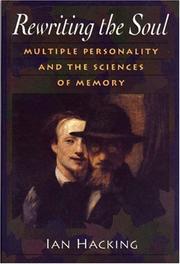
ISBN: 1400811937 1282752235 9786612752230 1400821681 069105908X 069103642X 9781400821686 9780691059082 9780691036427 1400803268 Year: 1995 Publisher: Princeton, N.J. Princeton University Press
Abstract | Keywords | Export | Availability | Bookmark
 Loading...
Loading...Choose an application
- Reference Manager
- EndNote
- RefWorks (Direct export to RefWorks)
Twenty-five years ago one could list by name the tiny number of multiple personalities recorded in the history of Western medicine, but today hundreds of people receive treatment for dissociative disorders in every sizable town in North America. Clinicians, backed by a grassroots movement of patients and therapists, find child sexual abuse to be the primary cause of the illness, while critics accuse the “MPD” community of fostering false memories of childhood trauma. Here the distinguished philosopher Ian Hacking uses the MPD epidemic and its links with the contemporary concept of child abuse to scrutinize today’s moral and political climate, especially our power struggles about memory and our efforts to cope with psychological injuries.What is it like to suffer from multiple personality? Most diagnosed patients are women: why does gender matter? How does defining an illness affect the behavior of those who suffer from it? And, more generally, how do systems of knowledge about kinds of people interact with the people who are known about? Answering these and similar questions, Hacking explores the development of the modern multiple personality movement. He then turns to a fascinating series of historical vignettes about an earlier wave of multiples, people who were diagnosed as new ways of thinking about memory emerged, particularly in France, toward the end of the nineteenth century. Fervently occupied with the study of hypnotism, hysteria, sleepwalking, and fugue, scientists of this period aimed to take the soul away from the religious sphere. What better way to do this than to make memory a surrogate for the soul and then subject it to empirical investigation? Made possible by these nineteenth-century developments, the current outbreak of dissociative disorders is embedded in new political settings. Rewriting the Soul concludes with a powerful analysis linking historical and contemporary material in a fresh contribution to the archaeology of knowledge. As Foucault once identified a politics that centers on the body and another that classifies and organizes the human population, Hacking has now provided a masterful description of the politics of memory : the scientizing of the soul and the wounds it can receive.
Memory -- Social aspects. --- Multiple personality -- History. --- Multiple personality -- Philosophy. --- Multiple personality -- Social aspects. --- Soul -- Psychological aspects. --- Multiple personality --- Memory --- Soul --- Learning --- Dissociative Disorders --- Humanities --- Mental Processes --- Mental Disorders --- Psychiatry and Psychology --- Psychological Phenomena and Processes --- Philosophy --- Multiple Personality Disorder --- Psychiatry --- Health & Biological Sciences --- Psychiatric Disorders, Individual --- Social aspects --- History --- Psychological aspects --- Philosophy. --- Social aspects. --- History. --- Psychological aspects. --- Pneuma --- Alternating personality --- Consciousness, Multiple --- DID (Personality disorder) --- Dissociated personality --- Dissociative identity disorder --- Double consciousness --- Double personality --- Dual personality --- MPD (Personality disorder) --- Multiple consciousness --- Multiple identity disorder --- Multiple personalities --- Multiple personality disorder --- Personality, Multiple --- Split personality --- Retention (Psychology) --- -Multiple personality --- Dissociative disorders --- -Future life --- Future life --- Philosophical anthropology --- Theological anthropology --- Animism --- Spirit --- Intellect --- Psychology --- Thought and thinking --- Comprehension --- Executive functions (Neuropsychology) --- Mnemonics --- Perseveration (Psychology) --- Reproduction (Psychology) --- Cognitive psychology --- Multiple Persönlichkeit --- Gedächtnis --- Seele --- Philosophie --- Humans --- Memory (Mental processes) --- Human beings
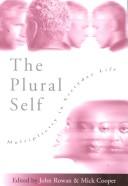
Abstract | Keywords | Export | Availability | Bookmark
 Loading...
Loading...Choose an application
- Reference Manager
- EndNote
- RefWorks (Direct export to RefWorks)
Sociology of culture --- Multiple personality. --- Personality. --- Persoonlijkheidspsychologie --- handboeken en inleidingen --- handboeken en inleidingen. --- Handboeken en inleidingen. --- Multiple personality --- Personality --- Personal identity --- Personality psychology --- Personality theory --- Personality traits --- Personology --- Traits, Personality --- Psychology --- Individuality --- Persons --- Self --- Temperament --- Alternating personality --- Consciousness, Multiple --- DID (Personality disorder) --- Dissociated personality --- Dissociative identity disorder --- Double consciousness --- Double personality --- Dual personality --- MPD (Personality disorder) --- Multiple consciousness --- Multiple identity disorder --- Multiple personalities --- Multiple personality disorder --- Personality, Multiple --- Split personality --- Dissociative disorders
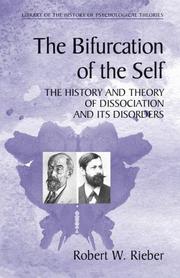
ISBN: 1280613653 9786610613656 0387274146 0387274138 Year: 2006 Publisher: New York : Springer,
Abstract | Keywords | Export | Availability | Bookmark
 Loading...
Loading...Choose an application
- Reference Manager
- EndNote
- RefWorks (Direct export to RefWorks)
For more than a hundred years, dissociative states, sometimes referred to as multiple personality disorder, have fascinated the public as well as scientists. The precise nature of this disorder is a controversial one, dividing clinicians, theorists, and researchers. Challenging the conventional wisdom on all sides, Robert Rieber’s Bifurcation of the Self traces the clinical and social history of dissociation in a provocative examination of this widely debated phenomenon. At the core of this history is a trio of related evolutions—hypnosis, concepts of identity, and dissociation—beginning with nineteenth-century "hysterics" and culminating in the modern boom in Dissociative Identity Disorder (DID) diagnoses and the parallel rise in childhood abuse/repressed memory cases. Rieber does not argue the non-existence of DID; rather he asserts that it is a rare disorder exaggerated by dissociation advocates and exploited by the media. In doing so, he takes on some of the most difficult questions in the field: How crucial is memory to a person’s identity? Can two or more autonomous personalities actually exist in the same body? If trauma causes dissociation, why aren’t there more DID cases? Why are DID cases prevalent in some eras but not in others? Does dissociative disorder belong in the DSM? The book is rigorously illustrated with two centuries’ worth of famous cases including Christine Beauchamp, Ansel Bourne, Eve Black/Eve White, and most notably the woman known as "Sybil", whose story is covered in depth with newly revealed manuscripts. And Rieber reviews the current state of DID-related controversy, from the professionals who feel that the condition is underreported to those who consider it a form of malingering, so that readers may draw their own conclusions.
Multiple personality --- Dissociative disorders --- Hypnotism. --- History. --- Schreiber, Flora Rheta. --- Wilbur, C. B. --- Dorsett, Sybil. --- Autosuggestion --- Braidism --- Hypnosis --- Trance --- Animal magnetism --- Mesmerism --- DDs (Psychology) --- Disorders, Dissociative --- Dissociation (Psychology) --- Psychology, Pathological --- Alternating personality --- Consciousness, Multiple --- DID (Personality disorder) --- Dissociated personality --- Dissociative identity disorder --- Double consciousness --- Double personality --- Dual personality --- MPD (Personality disorder) --- Multiple consciousness --- Multiple identity disorder --- Multiple personalities --- Multiple personality disorder --- Personality, Multiple --- Split personality --- Wilbur, Cornelia B.
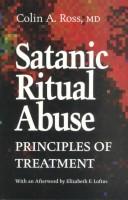
ISBN: 0802073573 0802028578 Year: 1995 Publisher: Toronto ; Buffalo ; London University of Toronto Press
Abstract | Keywords | Export | Availability | Bookmark
 Loading...
Loading...Choose an application
- Reference Manager
- EndNote
- RefWorks (Direct export to RefWorks)
Multiple personality --- -Ritual abuse victims --- -Satanism --- -Black Mass --- Devil-worship --- Satanic cults --- Worship of Satan --- Cults --- Occultism --- Victims of ritual abuse --- Victims of crimes --- Alternating personality --- Consciousness, Multiple --- DID (Personality disorder) --- Dissociated personality --- Dissociative identity disorder --- Double consciousness --- Double personality --- Dual personality --- MPD (Personality disorder) --- Multiple consciousness --- Multiple identity disorder --- Multiple personalities --- Multiple personality disorder --- Personality, Multiple --- Split personality --- Dissociative disorders --- Treatment --- Rehabilitation --- Rituals --- Ritual abuse victims --- Satanism --- Treatment. --- Rehabilitation. --- Rituals. --- -Treatment --- Ritual --- Ritual abuse
| Listing 1 - 10 of 15 | << page >> |
Sort by
|

 Search
Search Feedback
Feedback About UniCat
About UniCat  Help
Help News
News